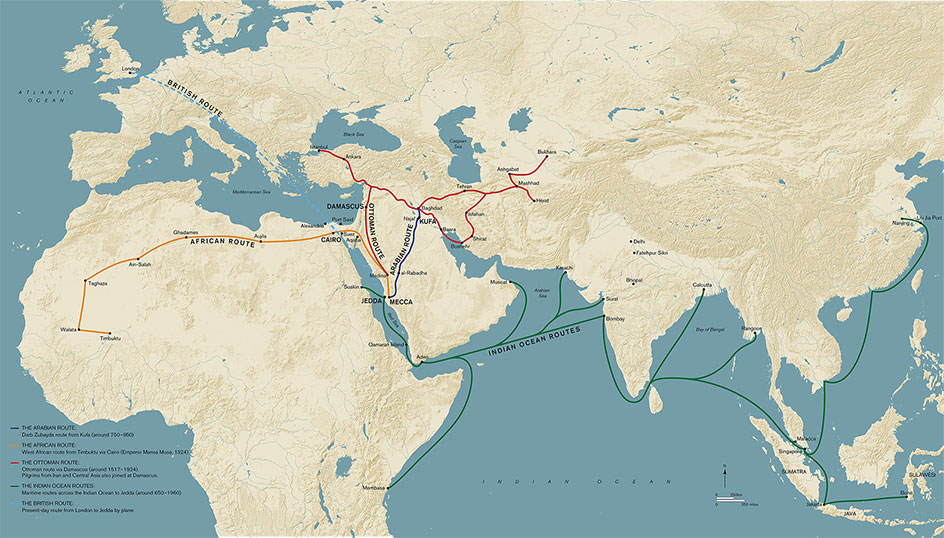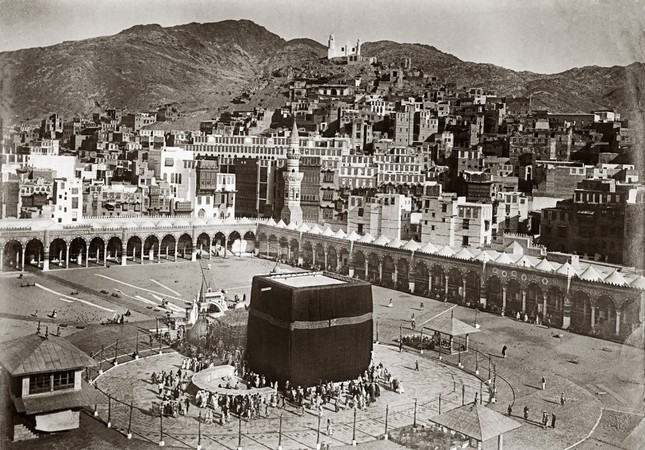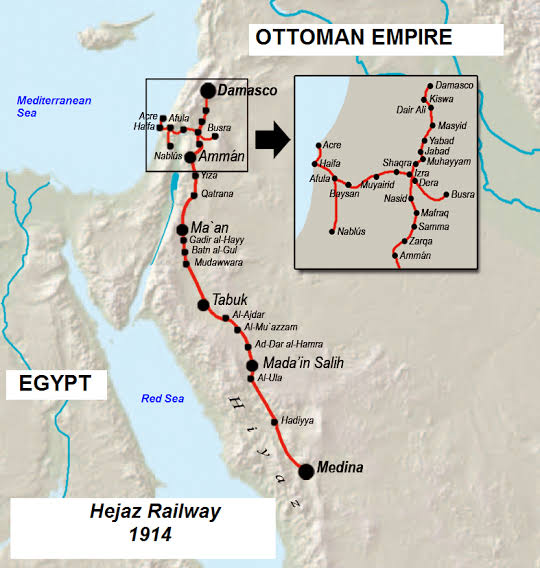issued for Ottoman health services in the Hejaz in 1914.
Prior to World War I the Ottomans and British were
somewhat cooperative with regard to health activities in
the region but that all changed after they became war
opponents.
In 1915 the crewmembers of the German warship Emden
made their way up through the Hejaz with the help of an
Ottoman official named Sami Çölgeçen, dodging
British-aided Bedouins all the way.
Escape Through The Hejaz click here for the related
TNT report.//

Hajj routes
18 - At each health center there will be a register for patients and, in
accordance with paragraph 52 of the regulations, the patient's name,
occupation, race, nationality, the illness, neighborhood of residence,
and symptoms will be entered in the register.
19 - Patients at the health centers will be examined in turn and when
a patient's turn comes he will be examined promptly and without being
kept waiting.

a patient's turn comes he will be examined promptly and without being
kept waiting.
20 - Applicants from convoys that arrive at Bahrah can apply for
health services from the time they arrive until the time they leave.
health services from the time they arrive until the time they leave.
21 - At each health center a health policeman will be on duty at the
center and another at the market and in the neighborhood. The center
policeman will be relieved every 24 hours and the market and
neighborhood policemen will be changed every two hours.

22 - The center policeman will ensure public order at the center,
supervise cleaning and fumigation activities, ensure that the needed
equipment and materials are available, assist the public and distribute
line numbers to the patients.
center and another at the market and in the neighborhood. The center
policeman will be relieved every 24 hours and the market and
neighborhood policemen will be changed every two hours.
22 - The center policeman will ensure public order at the center,
supervise cleaning and fumigation activities, ensure that the needed
equipment and materials are available, assist the public and distribute
line numbers to the patients.
23 - The market and neighborhood policemen will perform the duties
stated in the regulations. When they encounter comestibles and
drinks that are harmful to health they will seize them and turn them
over to the center sergeant.
24 - In the event that center policemen encounter unusual activity
during their duty hours, they will inform the center sergeant by means
of an activity report.
stated in the regulations. When they encounter comestibles and
drinks that are harmful to health they will seize them and turn them
over to the center sergeant.
24 - In the event that center policemen encounter unusual activity
during their duty hours, they will inform the center sergeant by means
of an activity report.
25 - Poor pilgrims found on the streets will be transported to shelters
by the market and neighborhood policemen. Sick people and dead
bodies will be transported quickly and animal carcasses will be
removed from the streets right away, for burial outside the city. The
center sergeants are to be informed of developments. With regard to
these matters, the slightest fault will call for severe punishment.

Ottoman water-purification facility and equipment in the Hejaz.
26 - The center policemen will not patrol the market and neighbor-
hoods in the afternoon but in the event that an urgent incident occurs
they must report for duty.
by the market and neighborhood policemen. Sick people and dead
bodies will be transported quickly and animal carcasses will be
removed from the streets right away, for burial outside the city. The
center sergeants are to be informed of developments. With regard to
these matters, the slightest fault will call for severe punishment.

Ottoman water-purification facility and equipment in the Hejaz.
26 - The center policemen will not patrol the market and neighbor-
hoods in the afternoon but in the event that an urgent incident occurs
they must report for duty.
27 - Two health policemen at the center will attend to fumigation
affairs when they are not on guard duty.
28 - The center health sergeant will supervise the policemen in the
neighborhooods in the performance of their duties, ensure that the
policemen are changed out on time and take responsibility for the
manner in which the policemen accompanying him perform their
duties.
affairs when they are not on guard duty.
28 - The center health sergeant will supervise the policemen in the
neighborhooods in the performance of their duties, ensure that the
policemen are changed out on time and take responsibility for the
manner in which the policemen accompanying him perform their
duties.
29 - When the center health sergeant learns of an ill person or a body
or an animal carcass, on one of the streets tied to the center, he will go
there immediately. He will then determine how long this situation has
gone on and whether or not the policeman on duty performed his duty
properly. The center sergeant will present a written report about the
situation to the center doctor and to the police chief.
30 -The center sergeant is ultimately responsible for the delay-free care
of ill people and bodies on the streets, and for the removal-burial of
animal carcasses.
or an animal carcass, on one of the streets tied to the center, he will go
there immediately. He will then determine how long this situation has
gone on and whether or not the policeman on duty performed his duty
properly. The center sergeant will present a written report about the
situation to the center doctor and to the police chief.
30 -The center sergeant is ultimately responsible for the delay-free care
of ill people and bodies on the streets, and for the removal-burial of
animal carcasses.

31 - The health policemen at the Bahrah and Taif centers will perform
all the duties of a health policeman. They will send a report to their
center docotr and a copy to their team sergeant.
32 - The nurses at Bahrah and Taif centers will look after patients who
apply to the center and those in the hospital. The nurses will also assist
the health policemen in fumigation and other duties.
all the duties of a health policeman. They will send a report to their
center docotr and a copy to their team sergeant.
32 - The nurses at Bahrah and Taif centers will look after patients who
apply to the center and those in the hospital. The nurses will also assist
the health policemen in fumigation and other duties.
33 - All health personnel at all the centers are obliged to be respectful
and considerate toward the pilgrims and the local populace who make
applications to the centers.
11 Ramazan 1332
21 July 1330 (1914)
and considerate toward the pilgrims and the local populace who make
applications to the centers.
11 Ramazan 1332
21 July 1330 (1914)
Director for Hejaz Health Services
Kasım İzzeddin
//END of PART II/FINAL//
//END of PART II/FINAL//

Hiç yorum yok:
Yorum Gönder